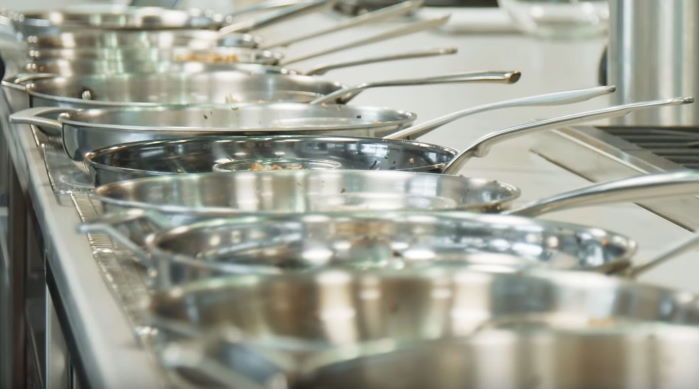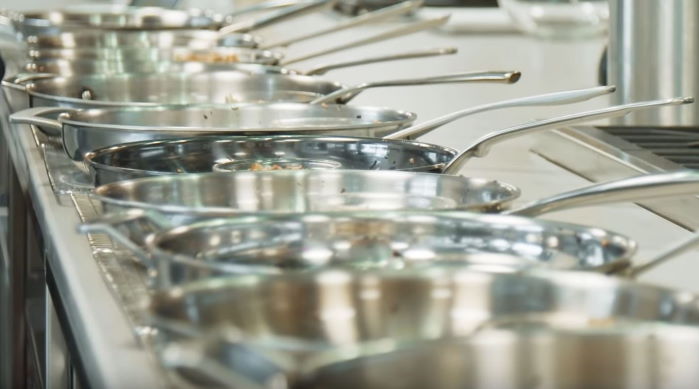How To Care For Stainless Steel Cookware?
Stainless steel cookware is renowned for its durability and longevity, but taking proper care of your cookware sets is crucial to keep them in top condition.
In this guide, I’ll explore the best practices for maintaining your stainless steel cooking pans, so you can enjoy their exceptional performance for years to come. From cleaning techniques to cooking tips, I’ve got you covered with expert advice from Basenjimom’s Kitchen.
Contents
- Clean in warm soapy water and dry it
- Avoid harsh cleaning agents and sponges
- Use oil while cooking
- Cook on medium heat
- Don’t soak your pan while hot
- Remove stains with vinegar and water
- Don’t put very cold food directly on the pan
- Don’t use tempered glass lids in the oven and microwave
- You should also avoid hitting the lids because the glass might break
- Conclusion
Clean in warm soapy water and dry it
When you buy or have your cooking set delivered, the first thing you should do before cooking in it is cleaning it in warm soapy water. This will keep it looking beautiful and it is something you should do every time you use your cookware.
Do not use a pot twice without cleaning because food from the previous cooking session will stick to the pan when reheated and cause discoloration.
Avoid soaking the pot for hours because doing so causes pitting.
After that, rinse and dry it with a clean towel. Hand drying your frying pan will make it shine because that is what happens to stainless steel.
The drying part should come immediately after cleaning to avoid having water spots on your cooking utensils. If the pan gets water spots, moisten your sponge and sprinkle some baking soda on it then rub that sponge on the pan. The spots will disappear.
Avoid harsh cleaning agents and sponges
You may want your best stainless steel cookware set to sparkle which is natural. However, do not use harsh or abrasive cleaning agents to achieve this. Bleach, metal scouring pads, and steel wool should also be out of the question when you are thinking of cleaning your stainless steel cooking utensils.
Use oil while cooking
Some people do not like using oil when cooking and that is okay. However, you cannot do that with stainless steel because the food will get stuck in the skillet which may start the process of staining.
Make sure to put some oil, butter, cooking spray or margarine on your pan before you start cooking. Give it about one or two minutes and then add your food. The food will not stick to the pot.
Cook on medium heat
Sometimes, we get the temptation to cook on high heat especially when we are in a hurry. That is not recommended when using stainless steel cookware. Medium heat is preferred because it will prevent food from sticking to the pans and pots.
Don’t soak your pan while hot
When you are done with cooking, resist the temptation to immediately soak the pot in readiness for cleaning. If you do this while your pan is hot, it will lead to warping which we do not want.
Give your skillet time to cool and then soak it.

Remove stains with vinegar and water
You may follow all the mentioned steps but still, notice a few stains on your cooking utensils. If this happens, use water and vinegar to clean your stainless steel cookware. The stains will come off.
The same cleaning process applies if the frying pans have chalky white residue. These are usually hard water stains.
Another thing you can do is use cleaning agents that remove stains gently. An example is the Bar Keepers Friend which come highly recommended. Cameo aluminum and stainless steel cleaner is also great at cleaning and polishing stainless steel products. Therefore, you can use it on the pots and pans.
Don’t put very cold food directly on the pan
When you remove food from the freezer and immediately put it on your cooking pan, the food will stick to the pot or pan. The steel from your cookware tends to contract when exposed to cold temperatures.
If you know you’ll be cooking meat or fish later, it’s advisable to get it out of the freezer and allow it to cool. When it gets to room temperature then you can turn on the heat and cook it in your skillet.
It is normal for frozen food to have excess moisture after thawing. Use a paper towel or a clean piece of cloth to dab the food to get rid of that moisture before putting the food in the pot.
Don’t use tempered glass lids in the oven and microwave
While caring for your cookware sets, always remember the glass lids and covers too. Even thou the covers are made of tempered glass, they do not do well with too much heat. That is why you shouldn’t put them in the microwave, broiler or toaster oven.
You should also avoid hitting the lids because the glass might break
If you notice that your glass cover is cracking or shipping, replace it immediately. Don’t continue using it because it may shatter and this can be dangerous when you are cooking since the glass can get into food or the flying broken pieces can harm you.
Conclusion
As my grandma used to say, taking care of your stainless steel cookware is essential for maintaining its performance and appearance.
By following these guidelines, you’ll be able to keep your cookware looking and functioning like new for years to come. Remember to clean your cookware properly, use oil while cooking, and cook on medium heat to prevent food from sticking. Avoid soaking hot pans, using harsh cleaning agents, and putting very cold food directly on the pan.
With these tips in mind, you’ll be able to enjoy the benefits of your stainless steel cookware and impress your guests with delicious meals cooked in pristine pans.
